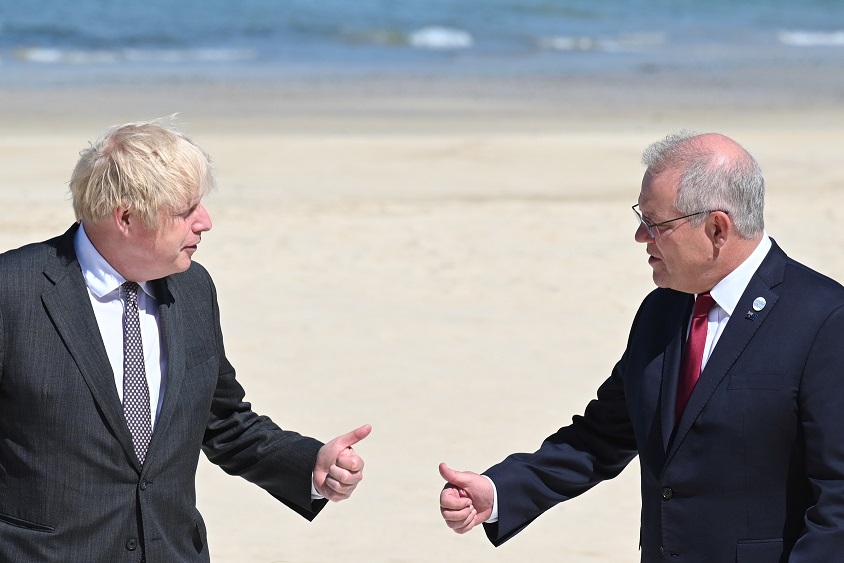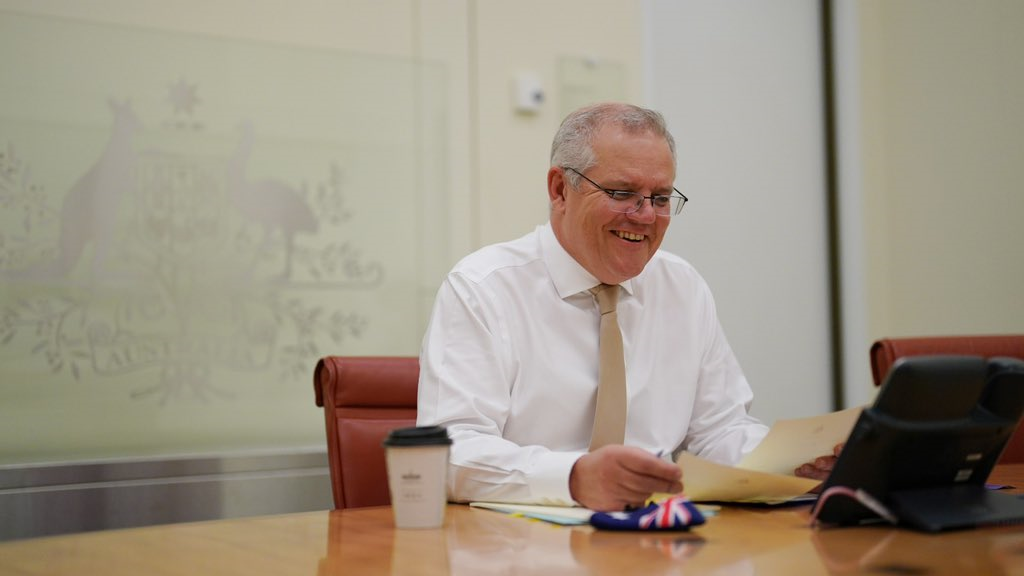Cover Image (© POOL / REUTERS)
With this week’s announcement of the AUKUS pact between the United States, the United Kingdom and Australia, the West has brewed a plan to become more than a storm in a teacup against China’s increasingly aggressive stance.
The comprehensive agreement involves technology transfers in cyber security and surveillance, artificial intelligence and military designs, starting with US and UK assistance to build Australian nuclear submarines.
The team at Nexus has worked in this particular area of defence industry policy for a number of years and have analysed the announcement and the Pact’s implications in the Pacific and the potential future of AU-UK-US relations.
FROM SNUBBED TO LOVED: AUKUS IN CONTEXT
Prime Minister Morrison was widely and wrongly mocked for President Biden’s apparent snubbing during the G7 this June when British Prime Minister, the Rt Hon Boris Johnson, joined what was meant to be one-on-one with the US and Australian leaders.
The G7 meeting resulted in a short joint statement: that the parties had ‘agreed that the strategic context in the Indo-Pacific was changing and that there was a strong rationale for deepening cooperation’. As events after G7 have now shown, these were more than empty words. As our Nexus Chair, Nick Campbell often states “with these type of leader to leader meetings, nothing is an accident”.
As mentioned by Nexus in this publication last week, we noted that the Hon Scott Morrison MP and the US President had not yet revealed the extent to which they intend to cooperate. It is now unequivocal that America’s ‘pivot to Asia’ will bolster and deepen Australia’s strategic alliance with the great power.
This relationship is demonstrated clearly in the transferal of nuclear propulsion technology to Australia – a technology the US had previously only relayed to the UK.
It builds on a history of cooperation and the shared heritage of our allied nations. While Australia and the US were founded as British colonies, recent history has reaffirmed and re-defined the partnership, with the US replacing the British as the dominant global power. In this capacity, Australian and British servicemen and women have fought along the US in the last three decades of Middle East intervention.
It also adds to a growing list of multilateral agreements that bind prominent English-speaking democratic nations together, with the Five Eyes Information sharing agreement being the most notable. Other important treaties include the UK and US’ involvement in NATO and the ANZUS treaty signed by New Zealand, the US and Australia.
In this context, the AUKUS pact can be seen as a continuation of cooperation by nation-states driven by the same heritage, values, a shared history and common adversaries. However, to explain the timing and depth of the agreement, it is necessary to consider what drives the triumvirs.
While domestic factors may explain the pact’s timing, a deeper look at foreign relations reveals why the alliance will reshape the Pacific theatre.
DOMESTIC
For all three leaders, the expedited timing of the AUKUS pact will serve to silence some sectors of domestic criticisms.
Facing the joint demands of a COVID recovery and post-Brexit fallout, the Rt Hon Minister Boris Johnson has looked to secure his position in the complex world of British politics. He remains astutely aware that his rise to power came about through his relationship with a stubbornly independent conservative backbench.
To counter criticisms of his government, the UK PM stated that the nuclear subs program ‘together with the other opportunities from AUKUS creates… hundreds of highly skilled jobs across the United Kingdom including in Scotland, the north of England and the Midlands…’. These are key domestic voting areas that are needed by the Conservative Party at the next election.
By emphasising the advantage to northern electorates crucial for his re-election, Prime Minister Johnson can also reinforce his well-trodden narrative; a UK free from the EU will trade and co-operate with the world to its advantage and on its own terms.
It is also not lost on Mr Johnson that his gain comes at the expense of the now-scrapped plans for French-made, conventional Attack-class submarines. With the French, one of the most rigid Brexit negotiators, it could be said that revenge is best served submerged and nuclear powered.
In a similar vein, the Hon Scott Morrison MP has freed himself from the controversial and slow Attack-class program and delivered tangibly better defence outcomes for the Commonwealth. While the Attack-class was planned, it was marred by an extended process, a ballooning budget and a perception in the defence establishment that its 2030’s timetable was too little, too late.
United States President Joe Biden has emphasised the global nature of the pact to his domestic constituents, reaffirming America’s power projection in the face of his embattled withdrawal from Afghanistan and the subsequent blow to US prestige.
By allaying fears that America has forsaken her allies, he has reassured his global partners that the days of Trump-era neo-isolationism are behind; Pax Americana is back, and its ‘pivot to Asia’ program will ensure the nation is ready to face the rising challenges of China to democracy in the emerging east.
FUTURE OF AUKUS
As the USA continues its ‘pivot to Asia’, it will continue to help develop Australia’s defence capabilities on land, air, space and at sea, with a growing military presence a going concern.
While the UK has not yet demonstrated the extent to which it will commit to the Indo-Pacific, it is evident that Britain will seek closer ties to the world superpower post-Brexit. The Rt Hon Boris Johnson MP’s interest in international affairs cannot be understated, and it is likely his hand still has a role to play in shaping the future of our region.
Finally, the decades of work ahead to develop the Australian nuclear fleet will continue to align our defence and security to the power of the USA around the globe. Whether that star continues to rise or begins to wane, it remains the surest path towards Australian sovereignty and Pacific peace.
CONCLUSION
In global affairs, biography often plays second fiddle to realpolitik analysis, and rightfully so. The natural inclination of many is to discount the personal in political spaces and abstract away the agency of policymakers in favour of the nebulous and subjective calculus of geopolitical considerations.
The truth is somewhere in between, in the case of AUKUS as well as any other. While the Alliance makes sense from a historical and geopolitical perspective, the personal relationship between the three leaders, and this big move, will influence the role of AUKUS in the years to come.
Latest posts by Nexus APAC (see all)
- United Kingdom General Election 2024: An Overview - April 15, 2024
- Australian Voters Go to the Polls - February 26, 2024
- Secretaries of Federal Departments – An Overview - February 1, 2024



